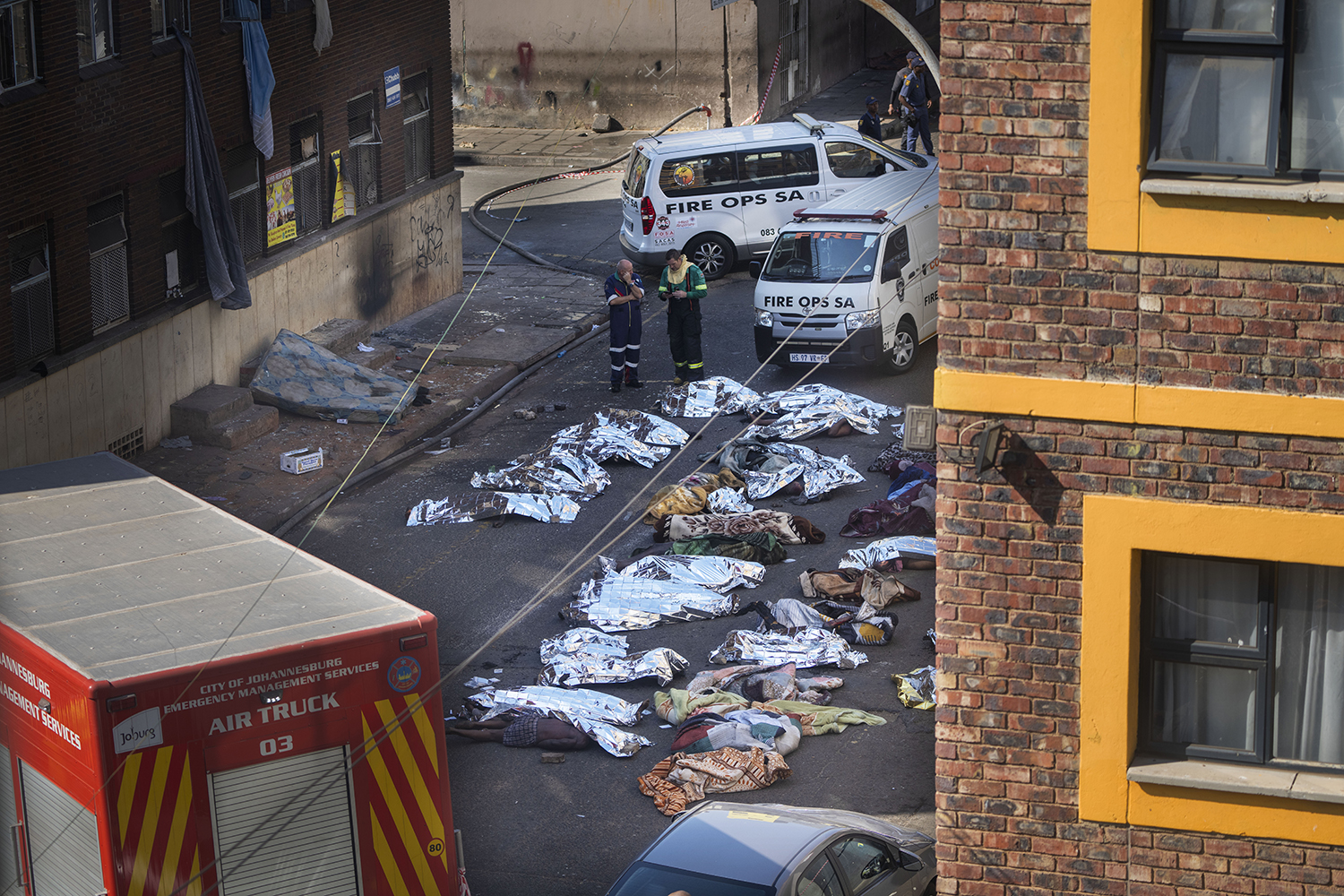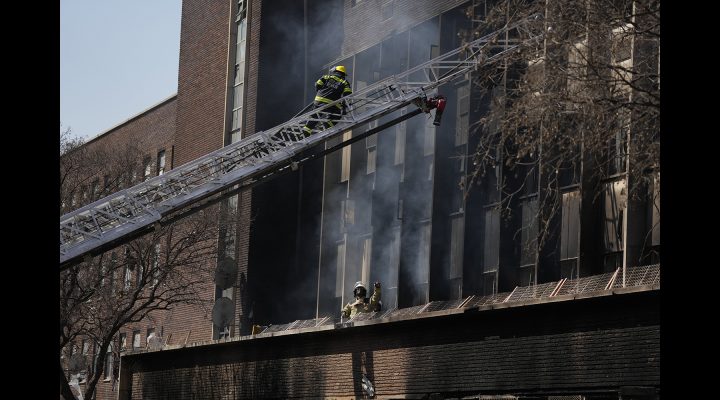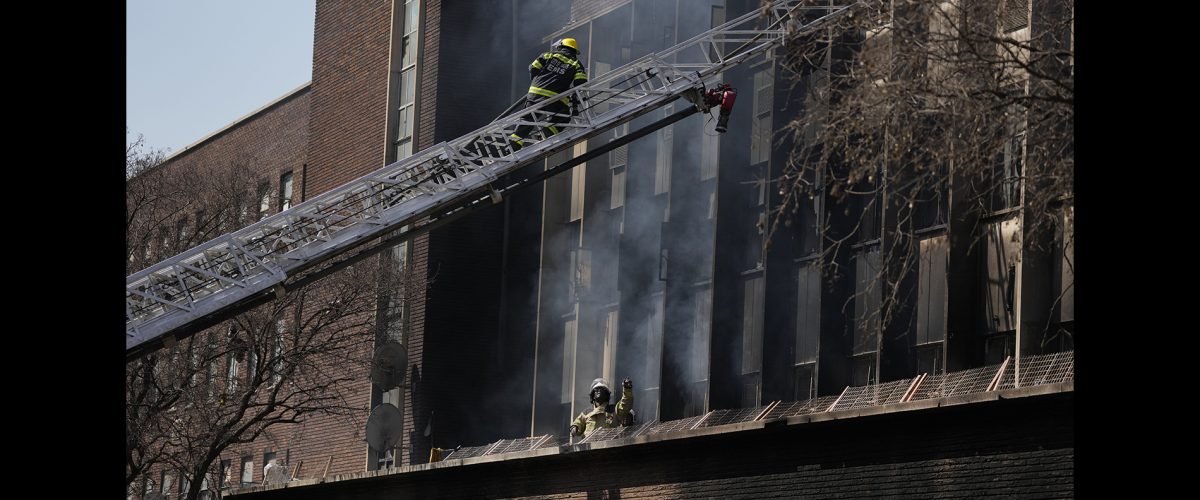Seventy-six people burned to death when a horrific fire tore through an illegally “hijacked” slum building in Johannesburg, South Africa’s, inner city. That many of the deceased and injured are undocumented African foreigners living on South African’s margins has shone a spotlight on “slum” churches run under the table by undocumented immigrants.
“We have lost our informal church, a makeshift room; two congregants were badly charred by fire and our entire furniture including a makeshift altar went up in blazes,” said Pauro, an undocumented African immigrant from the Congo.
Authorities in South Africa says dozens of occupants died in their sleep on Aug. 31 when a fire, probably from improvised cooking, tore through a “hijacked building” in Marshalltown, downtown Johannesburg, Africa’s most industrialized city.
“Hijacked buildings” is a euphemism employed by South Africa officials to describe lawless, abandoned, unsafe inner-city apartments where organized crime mafias wrest control of abandoned buildings and then section off rooms, before extracting illegal rents from desperate undocumented immigrants or formerly homeless people.
Typically, either the owners of the buildings — private or municipalities or central government — have abandoned the structures due to nonpayment of bills, rentals or an upsurge of neighborhood crime has made the buildings unattractive to maintain. Homeless people and undocumented immigrants usually seek shelter in such buildings’where crime cartels charge low rental rates like ZAR 180 ($10) per week, according to Juma Wandile, a former councilor with the Johannesburg Municipality.

Medics stand by the covered bodies of victims of a deadly blaze in downtown Johannesburg Thursday, Aug. 31, 2023. Dozens died when a fire ripped through a multi-story building in Johannesburg, South Africa’s biggest city, emergency services said Thursday. (AP Photo/Jerome Delay)
It is within the squeeze of such poorly maintained buildings that undocumented African immigrants in Johannesburg also set up underground, informal churches — sometimes right in kitchens or in bedrooms where the walls are just used plastic corn bags.
Pauro, who has lived in South Africa five years, earns a living by collecting trash bottles for recycling and has had multiple asylum claims rejected by authorities. He says undocumented foreigners like him fear to join lawfully registered churches or register their own because that puts them in the gaze of law enforcement and deportations.
“I grew up Catholic back home in the Congo, but to walk into a formal Catholic church here in South Africa is something I’m not comfortable to do. The church is lovely but sometimes immigration police spies can pose as worshippers and jot down my name,” he said.
It is also costly for undocumented people in South Africa to rent space for proper churches. “The permits, the security, the translation services are too much for undocumented immigrants trying to open a proper church in main street,” said Fuzani Xatsango, an undocumented immigrant who fled conflict in neighboring Mozambique and lives in a “hijacked building” where they conduct informal churches for the most vulnerable.
These undocumented churches are safe, Fuzani said, because “we can sing louder; police rarely venture inside; so, we know there are no immigration enforcement spies among us.”
But other dangers lurk. “Now we have lost our spaces because of the blaze,” he added.
As the official death toll still climbs in the latest South African fire, no one is counting the emotional and spiritual cost of “slum” churches and congregations that have been vanquished by the fires, said Bexi Jabalane, a trusted Lutheran pastor who, once monthly, visits the “hijacked buildings” to deliver new Bibles, maternity health care information for undocumented mothers, HIV testing and counseling sessions.
Officials in South Africa have vowed a police operation to reclaim these hijacked slum buildings. This would wipe out what remains of informal “slum buildings” immigrant churches, Pastor Jabalane fears.
“This will be an irresponsible blitz. It’ll deny worship rights to the most vulnerable of people living in South Africa’s shadows,” he said. Already, some undocumented people who lost all in the fire are reportedly refusing to go to free hospitals or free homeless shelters promised by the state for fear of arrest and deportation.
“After the fire, now do you want to lose their faith too? Really?”


